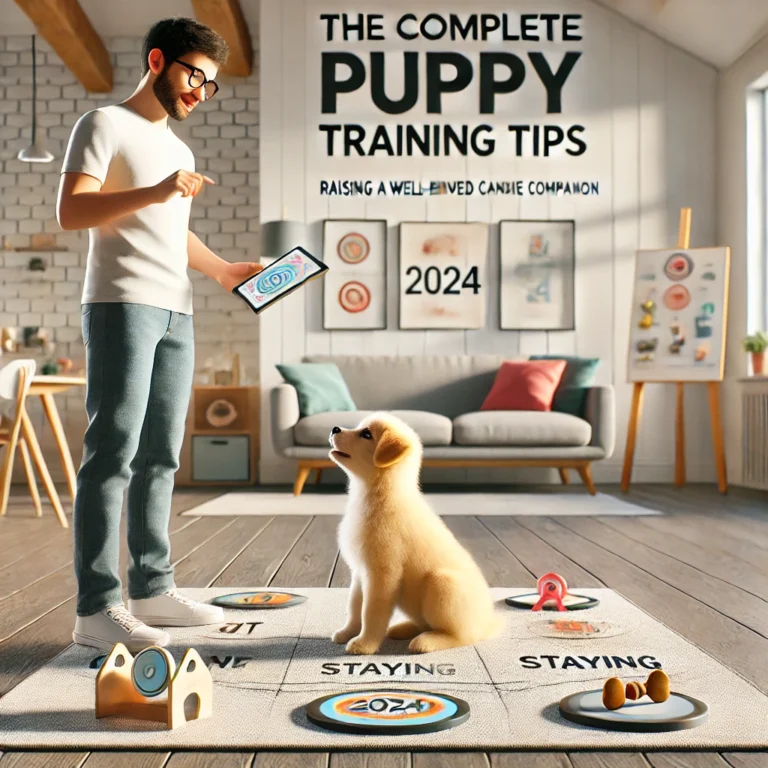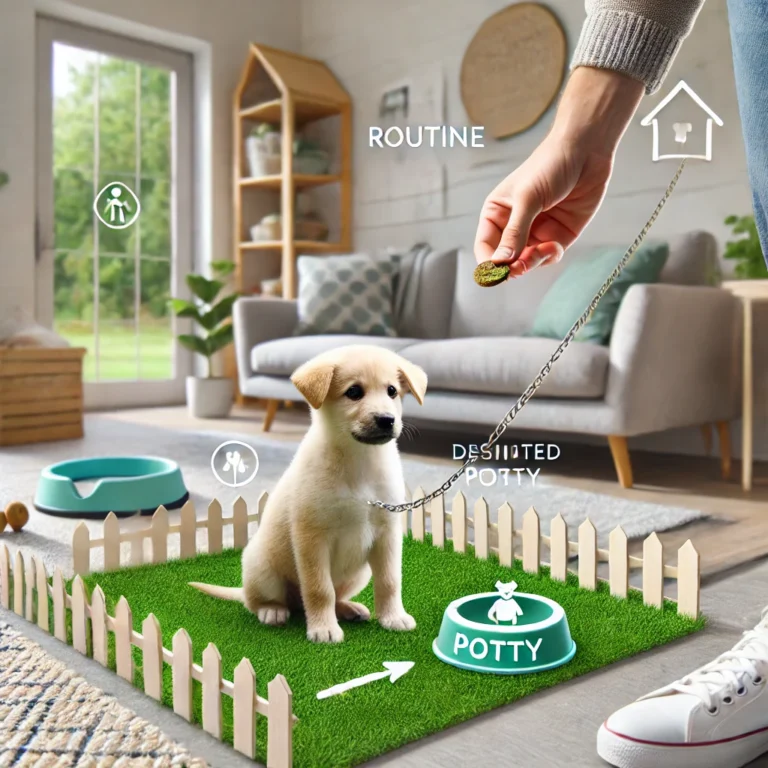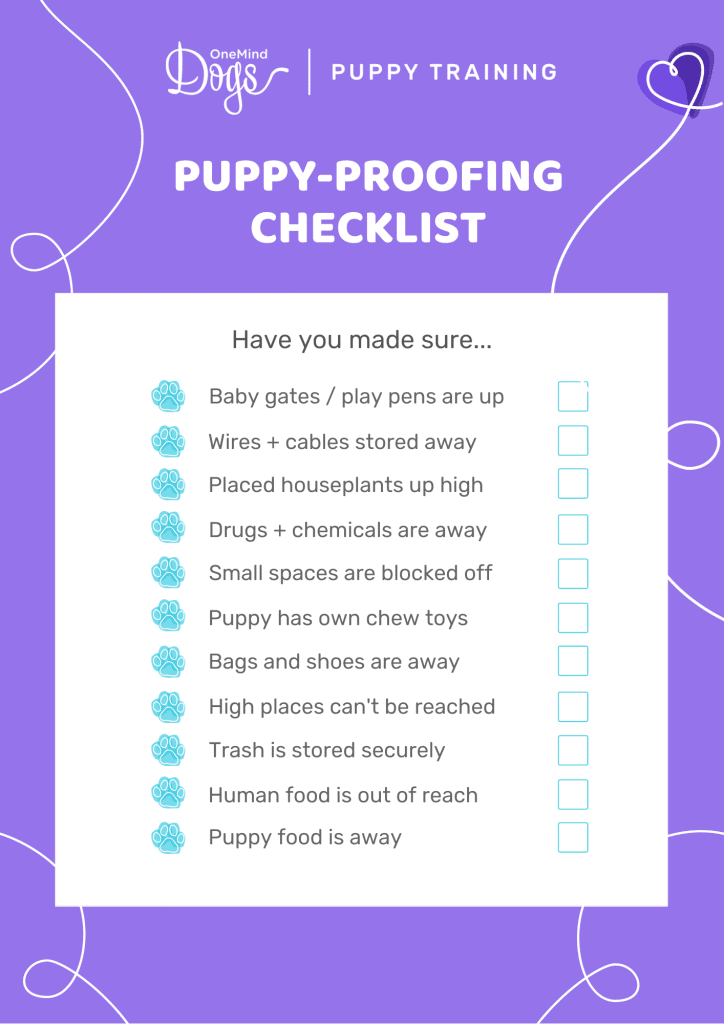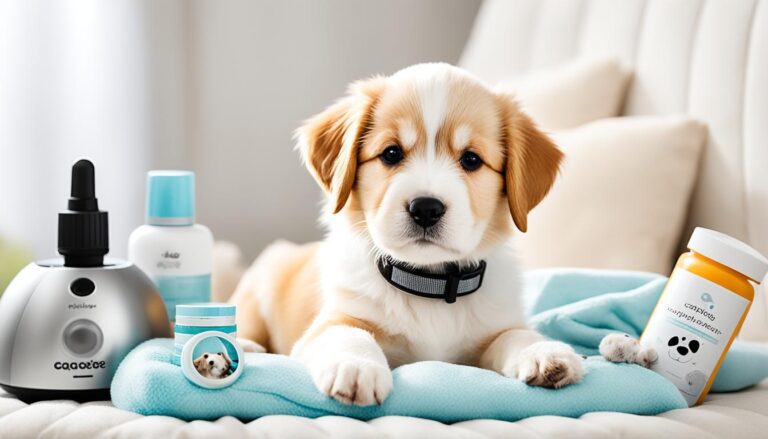8-Week Puppy Schedule: Setting Up for Success
Bringing home an 8-week-old puppy is an exciting time, but it can also be a bit overwhelming. To help new puppy owners get started on the right foot, I’ve put together an 8-week-old puppy schedule. This guide will help you and your new furry friend build good habits, start training early, and make puppy care more manageable.
Eating

Feeding your puppy might seem like a simple task, but it can have a big impact on their training and behavior. A consistent mealtime routine is key to preventing issues like aggression and resource guarding. For an 8-week-old puppy, you should aim to feed them 3-4 times a day. This schedule can stay the same until they are about 3 months old.
Puppy Feeding Schedule by Age
| Age | Meals per Day |
|---|---|
| 8 weeks | 3-4 |
| 3-6 months | 3 |
| 6-12 months | 2 |
Tips for Successful Mealtimes
- Observe your puppy during meals to catch any early signs of food aggression.
- Keep mealtimes calm and stress-free.
- Use mealtime as an opportunity to reinforce good behavior.
Feeding your puppy on a regular schedule helps them feel secure and can make training easier.
Puppy Potty Training

Potty training your puppy can feel like a challenge, but it doesn’t have to be! Making potty breaks a regular part of your day helps your pup learn where to go. Remember, your little buddy has a small bladder, so they can’t hold it for long. Here are some tips to help you out:
- Take your puppy out first thing in the morning, after meals, and before bed.
- If your puppy gets excited, they might have a little accident. This is normal, so don’t stress too much!
- Create a potty schedule to keep track of when you take them out. You can even use a chart to log their bathroom breaks.
| Time of Day | Activity |
|---|---|
| Morning | First potty break |
| After Meals | Potty break |
| Before Bed | Last potty break |
Pro Tip: When your puppy is out of their crate, take them out every 15 minutes at first. It might seem like a lot, but it’ll help prevent accidents. As they grow, you can space out the breaks more.
Training your puppy early and consistently is key to housebreaking a puppy. If they get used to going in the house, it’ll be harder to change that behavior later. So, stay patient and keep at it!
Puppy Exercise and Activity
Puppies are like toddlers, bursting with energy and always on the move. Keeping them active during the day is super important so they don’t go crazy or start chewing up your favorite shoes. Exercise is key to a happy and healthy pup.
Here are some fun activities to keep your puppy engaged:
- Fetch: A classic game that never gets old. It’s great for burning off energy.
- Tug-of-War: Perfect for building strength and having fun.
- Hide and Seek: Hide a toy or a treat and let your puppy find it. This game is great for mental stimulation.
- Short Walks: Take your puppy on short walks to explore the neighborhood. This also helps with Socializing a puppy.
Remember, a tired puppy is a well-behaved puppy. Keep them busy and you’ll both be happier.
Incorporating these activities into your daily routine will not only keep your puppy active but also help with their overall training. So, get the lowdown on how to train a puppy, and when to get started, with our handy expert tips, video guide and puppy training schedule by age.
Puppy Sleep
Puppies need a lot of sleep to grow healthy and strong. At 8 weeks old, your puppy may sleep up to 18-20 hours a day. This might seem like a lot, but it’s totally normal. Puppies will naturally fall asleep almost anywhere when they need to, so you don’t have to be too strict with their sleep schedule.
Make sure your puppy has a clean and comfy bed to sleep in. This helps them feel safe and secure. If you’re kennel training a puppy at night, place the kennel in a quiet spot where they won’t be disturbed. If you hear puppy whining in crate, a gentle hand on their side can help them settle down.
Evening Puppy Routine
- 3:00 pm: Wake up, potty, and play. Some puppies might take a nap from 6-7 pm.
- 7:00 pm: Dinner, play, and potty.
- 9:00 pm: Most puppies are fast asleep by now. Some might even be asleep by 8:30 pm.
As your puppy gets older, their playtime will get longer and naps will get shorter. Keep their feeding schedule consistent. Continue to feed them three times a day until they are six months old. After that, you can switch to twice a day.
Puppies need a lot of sleep to support their mental health dogs. Make sure they have a quiet and comfortable place to rest.
If you’re wondering why does my dog lick me before bed, it might be their way of showing affection or trying to calm down. To help with calming a hyper dog before bedtime, make sure they get plenty of exercise during the day. This will help them sleep better at night.
Remember, a well-rested puppy is a happy puppy. Stick to a routine and your puppy will be set up for success!
Socialization
Socialization is super important for your puppy. It helps them learn how to interact with other dogs and people. If they don’t get this chance, they might grow up to be scared or even aggressive. Healthy socialization can prevent these issues.
Start socializing your pup as soon as you can. It’s a fun activity that also helps tire them out. Here are some ideas to get you started:
- Meet the vacuum cleaner
- Listen to fireworks
- Watch the world go by
- Play dress up (so they get used to seeing people in different clothes)
- Sit in the car
- Meet new people (friends who come for a visit)
Puppies have a short window, often called the “imprinting period,” from 8 to 12 weeks old. During this time, they learn social skills and gain confidence around different people, animals, and activities.
Remember, the goal is to make these experiences positive. Keep it fun and light, and your puppy will grow up to be a well-adjusted dog.
Playtime
Playtime is a crucial part of your puppy’s day. It helps them burn off that extra puppy energy and have fun! Scheduled playtime throughout the day ensures you’re spending quality bonding time together. This is also a great chance to teach your puppy good play manners, like not nipping at hands and feet.
You can keep your pup entertained with a variety of toys. Whether it’s a game of fetch outside or a puzzle toy indoors, there are many ways to keep your puppy mentally and physically stimulated. Here are a few ideas:
- Fetch
- Tug-of-war
- Puzzle toys
- Hide and seek
Playtime and training sessions can be repeated in the afternoon to give your pup an outlet for energy and reinforce good behaviors. In the early stages, try to keep the training routines consistent to help solidify behaviors better.
Remember, you didn’t bring your puppy home to keep them in a pen! Share life with them, play with them, and socialize them. The 8-week-old puppy schedule helps puppies build habits on eating, playtime, potty training, and sleeping. Read here and learn how to raise your new puppy.
Leash Training
Leash training a puppy is one of the first skills you should work on. Start early to teach your puppy proper walking manners. The leash helps you guide your puppy and set boundaries, like keeping out of the kitchen or not bolting through doors. This way, you can calmly show your puppy what is expected without yelling or chasing.
Getting Started
Before you begin leash training, make sure your puppy is comfortable with a collar or harness. You might need to use these items for potty trips outside, so it’s important to build a positive association with them right away. This will help your puppy get used to wearing them faster.
First Steps
Begin in your backyard. Let your puppy get used to the leash with a little stroll around the grass. As your puppy gets older and understands what a walk means, you can gradually increase the distance.
Positive Reinforcement
Use positive reinforcement dog training techniques. Reward your puppy with treats and praise when they walk nicely on the leash. This encourages good behavior and makes the experience enjoyable for both of you.
Handling Challenges
If your puppy shows signs of dog separation anxiety solutions, be patient and consistent. Gradually increase the time and distance of your walks. If your dog is aggressive towards other dogs, keep a safe distance and use treats to distract and reward calm behavior.
Leash training is not just about walks; it’s about teaching your puppy boundaries and good manners. With patience and positive reinforcement, your puppy will learn to enjoy their walks and behave well on the leash.
Frequency of Meals
When it comes to feeding your puppy, most 8-week-old pups need three meals a day. This helps them get used to a routine and keeps their metabolism in check. Here’s a quick breakdown of why sticking to a schedule is super important:
- Consistency is Key: Regular meal times help your puppy know when to expect food, which can lead to better potty habits.
- Avoid Grazing: Leaving food out all day can lead to inconsistent eating and potty times, which means more messes for you to clean up!
- Calm Environment: Make sure mealtime is a peaceful experience. If your home is busy, find a quiet spot for your puppy to eat.
Here’s a simple feeding schedule you can follow:
| Age of Puppy | Meals per Day |
|---|---|
| 8 weeks | 3 |
| 3-6 months | 2 |
| 6 months+ | 2 (or as advised by vet) |
By keeping a regular feeding schedule, you’ll help your puppy feel secure and make potty training easier.
Remember, what goes in must come out! Knowing when your puppy eats will help you plan potty breaks better.
Puppy Food Options
Choosing the right food for your puppy is super important. Your vet has probably given you some advice, but let’s dive into some other options you might consider.
Dry Puppy Food
Dry puppy food is a popular choice. It’s convenient, has a long shelf life, and helps keep your puppy’s teeth clean. If you’re on a budget, Iams’ dry puppy food is a highly rated option, with a 4.7-star average rating from over 5,200 reviews on Amazon.
Wet Puppy Food
Wet food is another option. It’s usually more flavorful and can be easier for puppies to chew. However, it doesn’t last as long once opened and can be a bit pricier.
Homemade Puppy Food
If you prefer to make your own puppy food, there are plenty of healthy homemade dog food recipes available. This option allows you to control exactly what goes into your puppy’s meals, which can be great for puppies with specific dietary needs.
Homemade food can be a great way to ensure your puppy is getting all the nutrients they need.
Special Diets
Some puppies might need special diets due to health issues or breed-specific needs. For example, Bernese mountain dog health issues might require a specific diet. Always consult your vet before making any major changes to your puppy’s diet.
Treats
Don’t forget about treats! They can be a great way to reward your puppy during training. Just make sure they’re healthy and don’t make up more than 10% of your puppy’s daily caloric intake.
Here’s a quick table to summarize the options:
| Type of Food | Pros | Cons |
|---|---|---|
| Dry Puppy Food | Convenient, long shelf life | Can be less flavorful |
| Wet Puppy Food | Flavorful, easy to chew | Short shelf life, pricier |
| Homemade Puppy Food | Control over ingredients | Time-consuming, needs research |
Remember, every puppy is different. What works for one might not work for another. Keep an eye on your puppy’s health and consult your vet if you have any concerns.
Overnight Crate Training
Crate training your puppy at night can be a game-changer for both you and your furry friend. Crates provide a safe, secure, and cozy spot for your puppy to sleep and relax. They also help prevent unwanted behaviors like barking or jumping on furniture when everyone is asleep.
To start, create a consistent crate schedule for your puppy. This means setting specific times for your puppy to be in the crate, especially during natural nap times. Initially, limit crate time to about 1 1/2 hours and gradually increase it as your puppy gets older.
Here’s a simple overnight crate training plan:
- Place the crate in your bedroom so your puppy feels close to you.
- Gradually move the crate further away from your bed over a few nights.
- Eventually, move the crate to the room where your puppy will sleep long-term.
Remember, it might take a few weeks for your puppy to get used to the crate. Be patient and use positive reinforcement to make the crate a happy place.
During the first few weeks, you might need to wake up during the night to let your puppy out for a potty break. This helps in establishing a good toilet training routine. If you prefer, you can use a training pad near the crate for short-term use.
By following these steps, you’ll help your puppy develop crate confidence and ensure peaceful nights for both of you.
Conclusion
Raising an 8-week-old puppy can be a handful, but with a solid schedule, it becomes a lot more manageable. By sticking to a routine, you’ll help your new furry friend develop good habits and feel secure. Remember, consistency is key! Whether it’s feeding, potty breaks, playtime, or sleep, having a plan in place will set both you and your puppy up for success. So, take a deep breath, follow the schedule, and enjoy the journey of watching your puppy grow into a happy, well-behaved dog.
Key Takeaways
- Creating a daily schedule helps your puppy develop good habits and know what to expect.
- Regular potty breaks are crucial for successful house training.
- Exercise and playtime are important for your puppy’s physical and mental health.
- Socialization with people and other animals helps your puppy grow into a well-behaved dog.
- A consistent feeding schedule supports your puppy’s growth and development.
Frequently Asked Questions
Why is it important to have a schedule for my 8-week-old puppy?
Having a schedule helps your puppy learn what to expect each day, making training easier and reducing stress for both of you.
How often should my 8-week-old puppy eat?
Your puppy should eat three to four times a day. This helps keep their energy levels stable and supports healthy growth.
What is the best way to start potty training my puppy?
Start by taking your puppy outside frequently, especially after eating, playing, or sleeping. Praise them when they go potty outside.
How much exercise does an 8-week-old puppy need?
Puppies need short bursts of exercise throughout the day. About 5-10 minutes of playtime several times a day is enough at this age.
How can I help my puppy sleep through the night?
Create a comfortable sleeping area for your puppy and stick to a bedtime routine. Make sure they go potty before bed to avoid accidents.
What should I do if my puppy cries in the crate at night?
If your puppy cries, it might need to go potty or feel lonely. Make sure the crate is comfortable and consider placing it near your bed for reassurance.

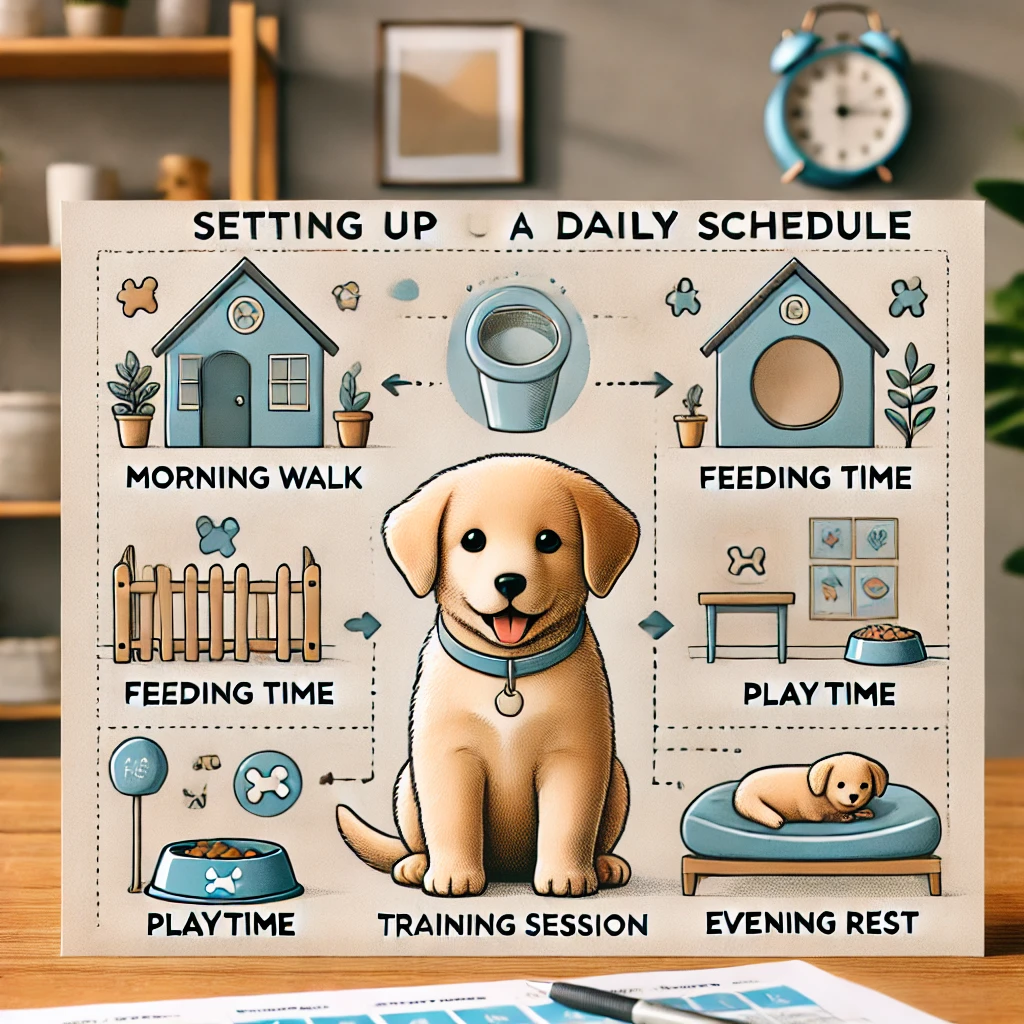
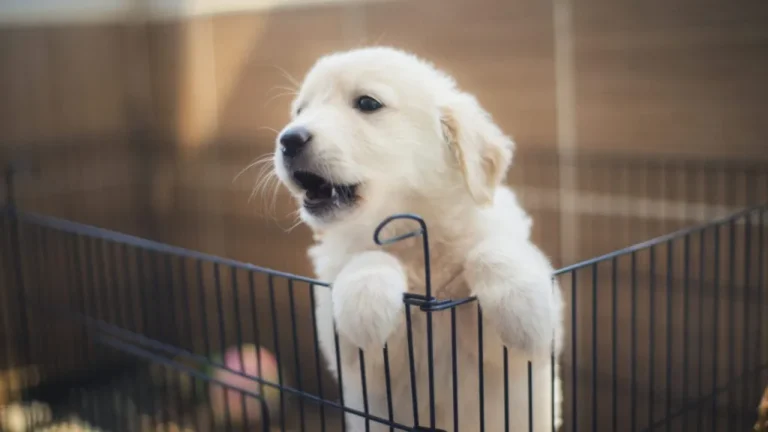
![Training a Puppy at Night]](https://quitepuppy.com/wp-content/uploads/2024/07/bec12dd0-874f-4260-a979-20199f474627-1-768x439.webp)
